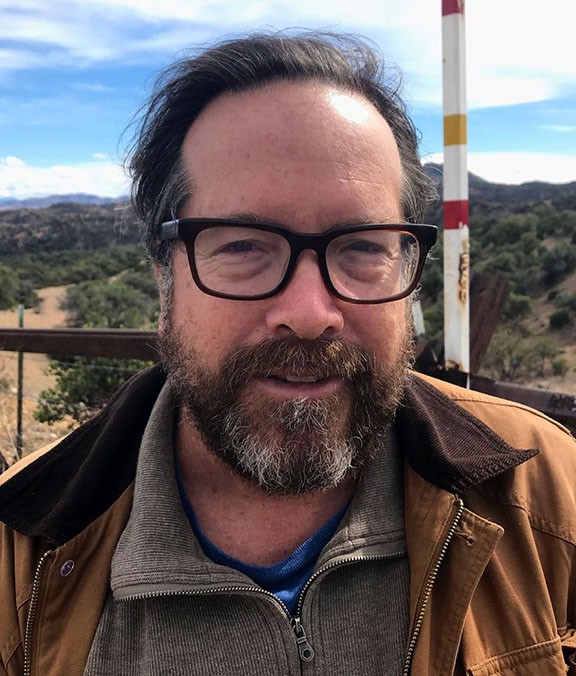You write in the introduction that the idea for this book came to you back in 2012 during a trip to Puerto Rico. Talk a little bit about what you saw there.
I was actually on a research trip for the first book that I wrote, Border Patrol Nation. And I was quite surprised, when I was on the west coast of Puerto Rico, to see the same green-striped Border Patrol vehicles that we see so often here in southern Arizona, and not only one or two, but a number of them that were doing patrols. And the west coast of Puerto Rico looks out onto the Mona Strait, which, if you cross the Mona Strait, you ended up at the Dominican Republic. So it's really the policing of the waters between the Dominican Republican and Puerto Rico. Then I interviewed on a park ranger who worked on the Mona Island. And the Mona Island is a U.S. territory about 30 miles away from the Dominican coast. And low and behold, not only had he told me that he had been deputized for immigration, if somebody landed on that on the Mona Island and they didn't have documents, well, he was obligated to arrest them. So I was startled to realize that the U.S. Border Patrol quite literally can expand itself all the way to 30 miles from the Dominican coast. And thinking about that, and thinking about that kind of elasticity or the expansion, was really what got me first thinking about Empire of Borders or thinking that, "Wow, there could be a book written about that."
What did you discover as you explored this idea more about where the borders, where these things were happening all around the globe?
By the time I sat down and really started researching this book, I knew that there was quite an international program. But I still, I didn't even realize the extent of it then. If you sat in front of a map of the world and pointed randomly, whatever country your finger ends up landing on, most likely some sort of program has come from the United States around their borders or immigration enforcement. That's how extensive it is. And it really, really, really started building up in the post-9/11 era because there was no such thing as a Customs and Border Protection attaché in an embassy before that. And now there are 23, so they've built up, and, of course, they always want to have more and more. I went to places like the Middle East and Africa and the Southeast Asia. It was a surprise to me to learn the extent of it, and how much it's grown in the post-9/11 era.
Your last book, Storming the Wall, looked at how climate change is driving migration all around the world. You definitely pick up that string in this book. We are certainly seeing a different type of border crosser here in Arizona and all along the Southwest border, as more families from Central America arrive here, as opposed to what we used to see, which was men from Mexico or perhaps further south seeking employment. Can you talk a little bit why so many families in Central America are coming to the United States?
There are multiple reasons for people coming from Central America, from Guatemala, from Honduras, from El Salvador. Each of those places has considerably different challenges that are happening, especially for the most marginalized people in those countries. And there are political challenges. There are economic model challenges, and there's an increasing ecological dynamic. Especially in the last 10 years in places like Honduras and Guatemala and El Salvador, there is the increasing ecological catastrophe sometimes but not limited to small farmers. Small farmers in western Honduras, small farmers in the highlands of Guatemala, small farmers that are in what is known as the dry corridor of these countries. "Dry corridor" is a term that, really, 10 years or 15 years ago, didn't even exist. And now this area is known for less and less rain, and when farmers plant their seeds, the rains will not come. And next thing you know, crops are wilting, and you're talking about some of the poorest people, economically speaking, in these countries. And so there is no cash to back them up, and all of a sudden they're in a total crisis. Last summer, when the droughts hit Central America and the rains didn't come, the World Food Programme estimated that 2 million people were impacted by the lack of rain and it would be a food crisis for over 1.5 million people. That does play into people making decisions to possibly head north and to the United States, and arriving across the border in Arizona for example. And not only single people but entire families at times.
There seem to be conflicting forces at work here between a push for globalization at the corporate and financial level and a push for a stronger borders when it comes to migration of people.
You could say that there is open borders for capital and money and finance and companies to cross borders to places like Mexico, like Central America—mining companies or that sort of thing, and there's a free pass. But at the same time, a person living in a town where a mine is taken over, where the water has been contaminated, where then people can't drink their own water—that could be one of the reasons that they leave and maybe even come to the United States. And those are the people who are blockaded. So you have an open-border policy for money and corporations and finance and the elites. And then, on the other hand, where the people most vulnerable or most impacted by such policies, the borders had been closed down, or it becomes much more difficult for those people to cross borders.


